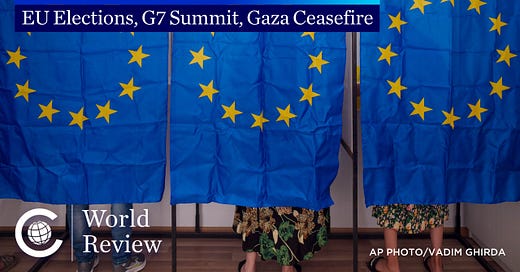Each Friday morning, I host a video podcast called “World Review with Ivo Daalder” where three journalists from major news outlets around the world join me in discussing the latest global news stories of the week.
This morning, June 14, I was joined by Karen DeYoung of the Washington Post, Stefan Kornelius of the Süddeutsche Zeitung, and Matt Kaminsky of Politico.
“World Review is always fascinating. I love the fact that you can get journalists from around the world to participate since zoom is the medium.”
— A Subscriber to America Abroad
While I encourage you to watch or listen to the episode (and subscribe wherever you get your podcasts!), here are a few interesting things I took away from our discussion:
The European Union elections, which concluded last Sunday, ended much as people expected — with a shift to the right, but the center holding. For the EU, the future now is largely set. In the next few weeks, leaders will hatch out who will hold what positions on the European Commission, with Ursula von der Leyen virtually guaranteed to win another five-year term as president. The big question is whether she will need votes from the far-right or the Greens to put her over the top in getting parliamentary support — with implications for EU immigration and climate policy hanging in the balance. But the real impact of these elections, Stefan argued, wasn’t in Brussels so much as in national capitals of member states. Key incumbents did badly — including, surprisingly, Hungary’s Victor Orban, and not-so-surprisingly Germany’s coalition government headed by Olaf Scholz and France’s Emmanuel Macron. The latter responded by calling snap parliamentary elections for the end of June — hoping this would break the “extremist fever” but risking the collapse of his political center instead. The one certainty is that weakness in the Franco-German motor of Europe does not spell much good for the EU in the months ahead.
The leaders of the largest democracies gathered in Bari, Italy, this week. All but the host, Giorgia Meloni, arrive in a weakened political state. Scholz and Macron just suffered major electoral defeats. Britain’s Sunak is about to be ousted in new elections. Canada’s Trudeau, Japan’s Kishida, and Biden are unpopular at home and may lose their hold on power. It’s possible that for many of them, this will be their last G7 Summit, Matt concluded. That, perhaps, explained why the meeting is bringing results — at least for Ukraine. After months of wrangling, the G7 leaders agreed to use the interest proceeds of Russian sovereign assets seized after the invasion in February 2022 as collateral for a $50b loan to Ukraine. Biden also joined his counterparts in signing a bilateral security agreement with President Zelenskyy spelling out a ten-year commitment to assist Ukraine. And the G7 endorsed the new sanctions framework announced by Washington that brought Russia’s foreign exchange market to a halt. The message to Putin was clear: If you think you can outlast Ukraine and us, think again. Even so, the specter of Trump, who could reverse all of these steps, unmistakably hung over the meeting and agreements.
Antony Blinken traveled to the Middle East on his eighth trip since October 7th to try and salvage a ceasefire agreement Washington has sought for months to conclude. His message was clear: the whole world wants an end to the fighting, a fact underscored by the UN Security Council, which endorsed the plan, and the G7 which similarly called on the parties to agree. There’s just one problem, Karen pointed out, neither Hamas nor the Israeli government is prepared to sign on. Hamas wants a guaranteed permanent end to the fighting and the withdrawal of Israel from the strip. Israel wants to make sure Hamas can never govern the strip or pose a threat to Israel. Both rather fight to win than give up now. That leaves Biden in the bind he’s found himself since October 7. And it leaves the possibility of escalation very much on the table — as both Israel and Hezbollah increase their ever more deadly exchanges of rocket fire across the northern border.
That’s it for my quick takes of this week’s episode here on America Abroad. To get the full flavor, please listen to the episode itself.





